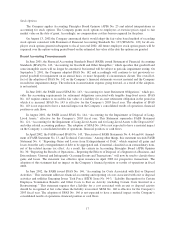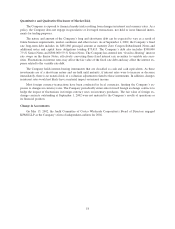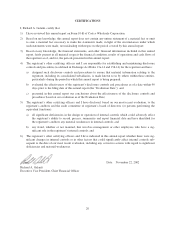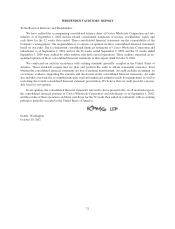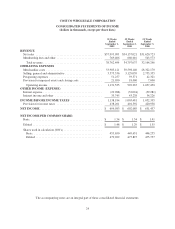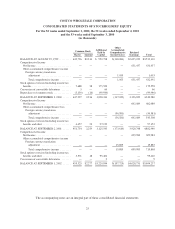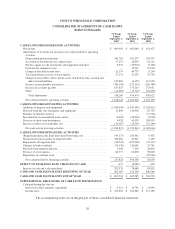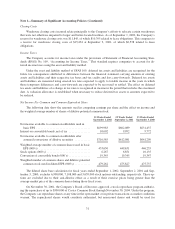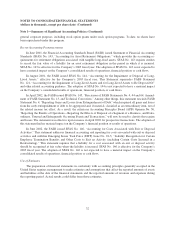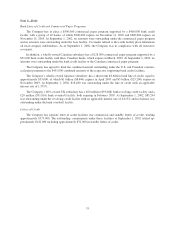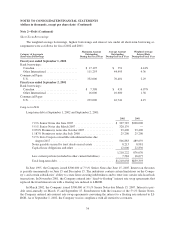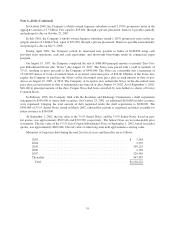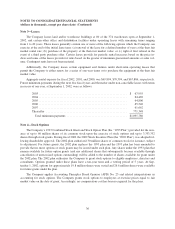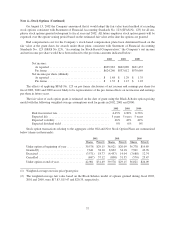Costco 2002 Annual Report Download - page 28
Download and view the complete annual report
Please find page 28 of the 2002 Costco annual report below. You can navigate through the pages in the report by either clicking on the pages listed below, or by using the keyword search tool below to find specific information within the annual report.COSTCO WHOLESALE CORPORATION
NOTES TO CONSOLIDATED FINANCIAL STATEMENTS
(dollars in thousands, except per share data)
Note 1—Summary of Significant Accounting Policies
Basis of Presentation
The consolidated financial statements include the accounts of Costco Wholesale Corporation, a Washington
corporation, and its subsidiaries (“Costco” or the “Company”). All material inter-company transactions between
the Company and its subsidiaries have been eliminated in consolidation. Costco primarily operates membership
warehouses under the Costco Wholesale name.
Costco operates membership warehouses that offer low prices on a limited selection of nationally branded
and selected private label products in a wide range of merchandise categories in no-frills, self-service warehouse
facilities. At September 1, 2002, Costco operated 394 warehouse clubs: 290 in the United States; 60 in Canada;
14 in the United Kingdom; five in Korea; three in Taiwan; two in Japan; and 20 warehouses in Mexico with a
joint venture partner.
The Company’s investment in the Costco Mexico joint venture and in other unconsolidated joint ventures
that are less than majority owned are accounted for under the equity method. The investment in Costco Mexico is
included in other assets and was $157,312 at September 1, 2002 and $147,905 at September 2, 2001. The equity
in earnings of Costco Mexico is included in interest income and other and for fiscal 2002, 2001 and 2000, was
$21,028, $17,378 and $10,592, respectively. The amount of retained earnings that represents undistributed earn-
ings of Costco Mexico was $64,674 and $43,646 at September 1, 2002 and September 2, 2001, respectively.
Fiscal Years
The Company reports on a 52/53-week fiscal year basis, which ends on the Sunday nearest August 31st.
Fiscal year 2002 was 52 weeks, fiscal year 2001 was 52 weeks and fiscal year 2000 was 53 weeks.
Cash Equivalents
The Company considers all highly liquid investments with a maturity of three months or less at the date of
purchase and proceeds due from credit and debit card transactions with settlement terms of less than five days to
be cash equivalents. Of the total cash and cash equivalents of $805,518 at September 1, 2002 and $602,585 at
September 2, 2001, credit and debit card receivables were $351,788 and $241,413, respectively.
Short-term Investments
Short-term investments consisted of corporate notes and bonds totaling $4,999 at September 2, 2001. These
investments at the end of fiscal 2001 were designated as being available-for-sale and, accordingly, were reported
at fair value. The fair market value of short-term investments approximates their carrying value and there were
no unrealized holding gains or losses at September 1, 2002, and no significant unrealized holding gains and
losses at September 2, 2001. Realized gains and losses are included in interest income and were not significant in
fiscal 2002, 2001, and 2000. Short-term investments held by the Company at September 2, 2001, matured be-
tween one and sixty days from the purchase date.
Receivables, net
Receivables consist primarily of vendor rebates and promotional allowances, receivables from government
tax authorities and other miscellaneous amounts due to the Company, and are net of allowance for doubtful
accounts of $2,224 at September 1, 2002 and $3,474 at September 2, 2001. Management determines the
allowance for doubtful accounts based on known troubled accounts and historical experience applied to an aging
of accounts.
27


